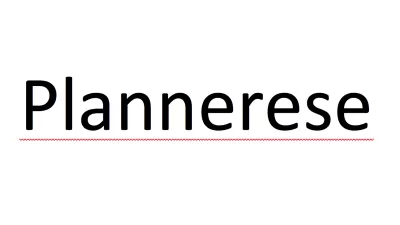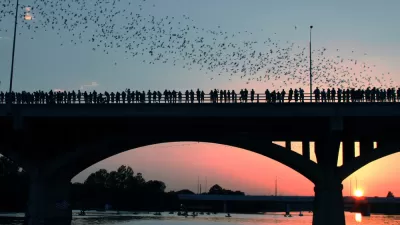The Planetizen managing editor answers questions about some of the post consistently befuddling grammar questions that arise when writing and talking about planning.

When should I capitalize the word City?
Few things scream bureaucrat like capitalizing the word city at every opportunity. City is not a proper noun, and should not be capitalized like one. New York City is a place name and a proper noun that includes the word city. The city of New York is a place that includes a proper noun. You see the difference? The City of Toronto saw the difference so much that it changed its official name to the City of Toronto, instead of just Toronto. I'll forgive confusion over those examples much more than capitalizing the word city when it's used by itself. So when writing council agendas, council motions, press releases, white papers, or anything else, there is certainly no need to capitalize city when you're using it as shorthand for the real name of the city. If you want to capitalize something so bad, use the full title.
When is it appropriate to use two spaces between sentences?
Never. Never, ever do that.
What does the word vibrant mean? I'm not sure anymore.
According to Google, vibrant is an adjective meaning "full of energy and enthusiasm," "quivering and pulsating," or "(of color) bright and striking." Considering that color is actually a manifestation of vibrations, the word vibrant is an incredibly rich word that manages to encapsulate what it describes. Very effective stuff. The problem with the word vibrant is when people use it for lack of any details and specifics about what it means in action, which leads to confusion about what the word actually means.
What's passive voice, and why does it matter if no one even knows what it is?
Combine the verb "to be" in all its forms (e.g., is, are, was, etc.) with a past participle (i.e., usually a verb ending in -ed) and you have the passive voice. The passive voice is so named because it subtracts a recognizable subject (i.e., the person or thing doing the stuff described in the sentence) from the sentence. Passive voice isn't so bad as long as you know when you're using it, and why. Also passive voice is bad when people use it to shirk responsibility or to deliberately confuse their audience. For the latter reason, being able to recognize passive voice when someone else is using it is a useful skill in decoding language.
Where do I put the apostrophe in the possessive form of Jane Jacobs? I'm really tired of writing "the possessive form of Jane Jacobs." It makes her look a little too needy.
This is a punctuation issue without a clear answer, but the most important thing is to be consistent. Some style guidelines will tell you that only ancient, famous names (like Jesus and Achilles) should be written without a second s following the apostrophe in the possessive form. If you follow that rule, it all depends on how you regard Jane Jacobs. To be fair, the same rules apply to Robert Moses.
FULL STORY: Ask the Editor: Planning Grammar Edition

Planetizen Federal Action Tracker
A weekly monitor of how Trump’s orders and actions are impacting planners and planning in America.

Maui's Vacation Rental Debate Turns Ugly
Verbal attacks, misinformation campaigns and fistfights plague a high-stakes debate to convert thousands of vacation rentals into long-term housing.

San Francisco Suspends Traffic Calming Amidst Record Deaths
Citing “a challenging fiscal landscape,” the city will cease the program on the heels of 42 traffic deaths, including 24 pedestrians.

Amtrak Rolls Out New Orleans to Alabama “Mardi Gras” Train
The new service will operate morning and evening departures between Mobile and New Orleans.

The Subversive Car-Free Guide to Trump's Great American Road Trip
Car-free ways to access Chicagoland’s best tourist attractions.

San Antonio and Austin are Fusing Into one Massive Megaregion
The region spanning the two central Texas cities is growing fast, posing challenges for local infrastructure and water supplies.
Urban Design for Planners 1: Software Tools
This six-course series explores essential urban design concepts using open source software and equips planners with the tools they need to participate fully in the urban design process.
Planning for Universal Design
Learn the tools for implementing Universal Design in planning regulations.
Heyer Gruel & Associates PA
JM Goldson LLC
Custer County Colorado
City of Camden Redevelopment Agency
City of Astoria
Transportation Research & Education Center (TREC) at Portland State University
Jefferson Parish Government
Camden Redevelopment Agency
City of Claremont




























